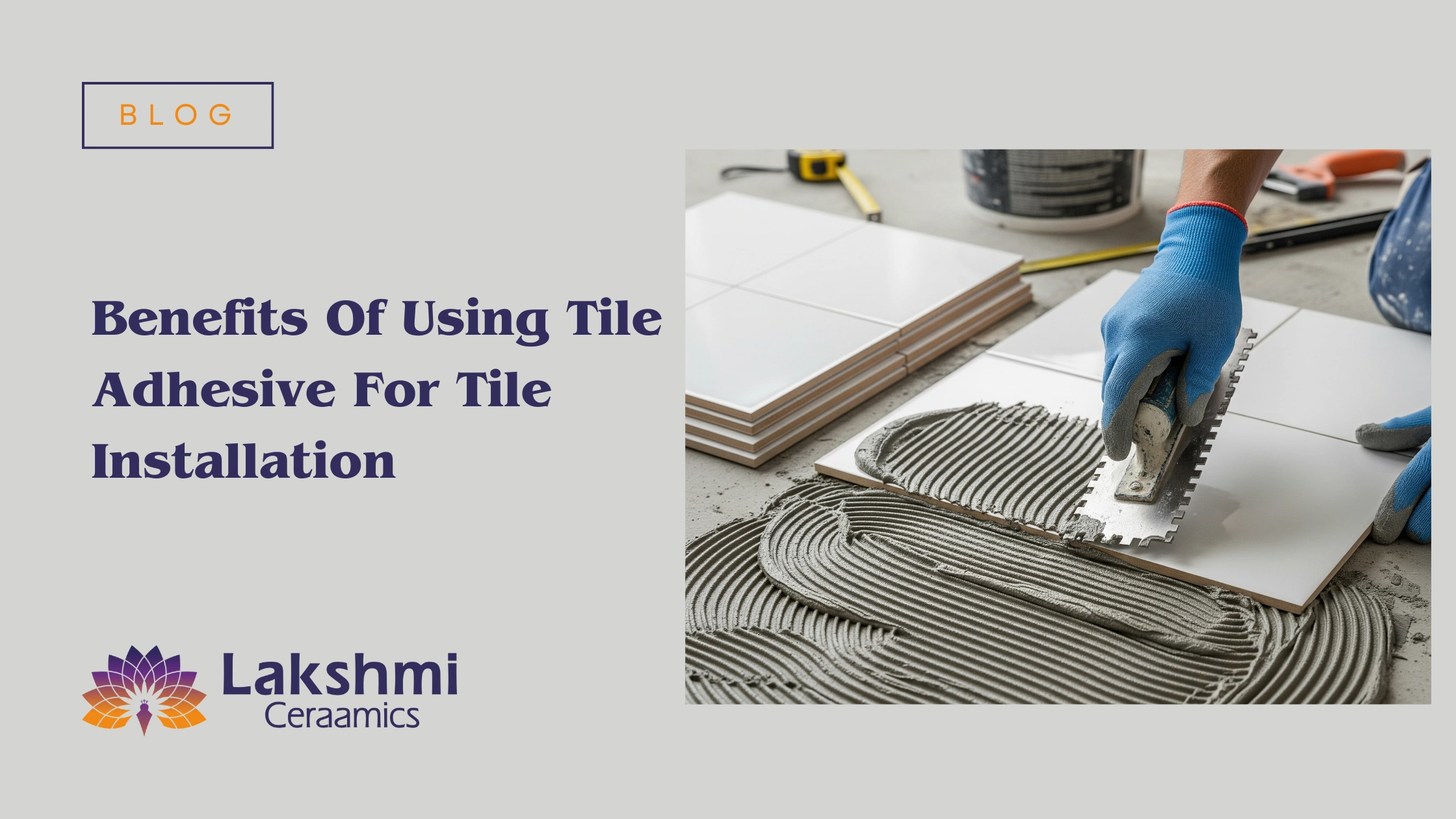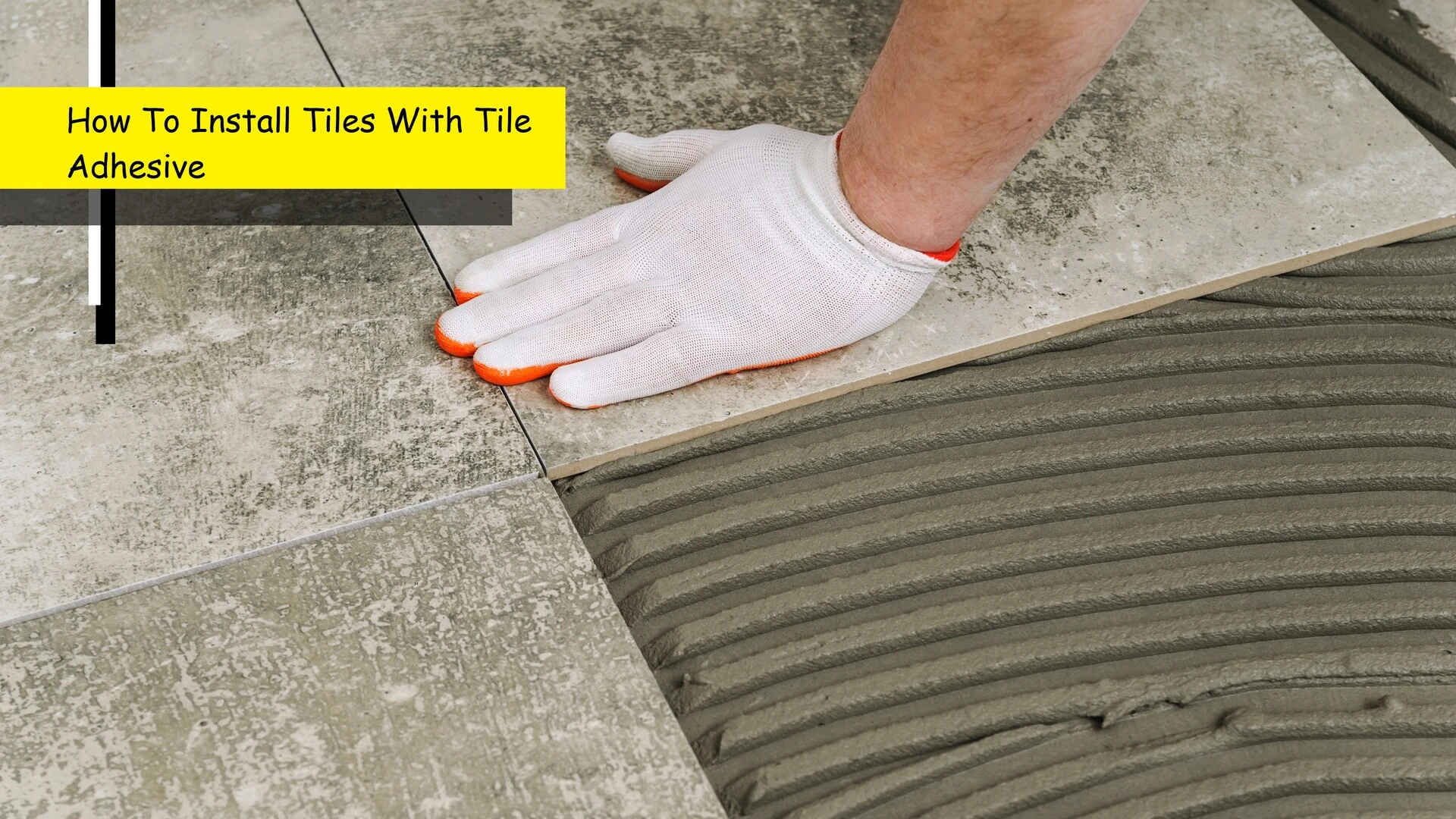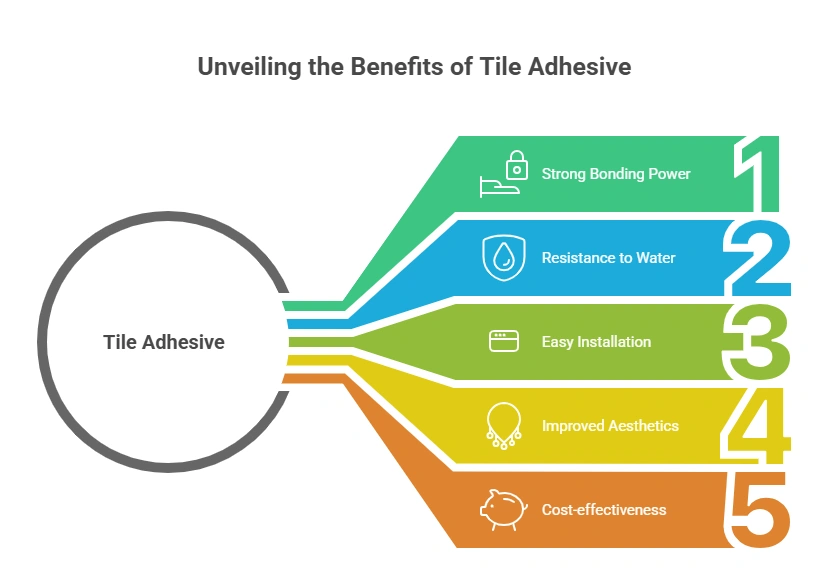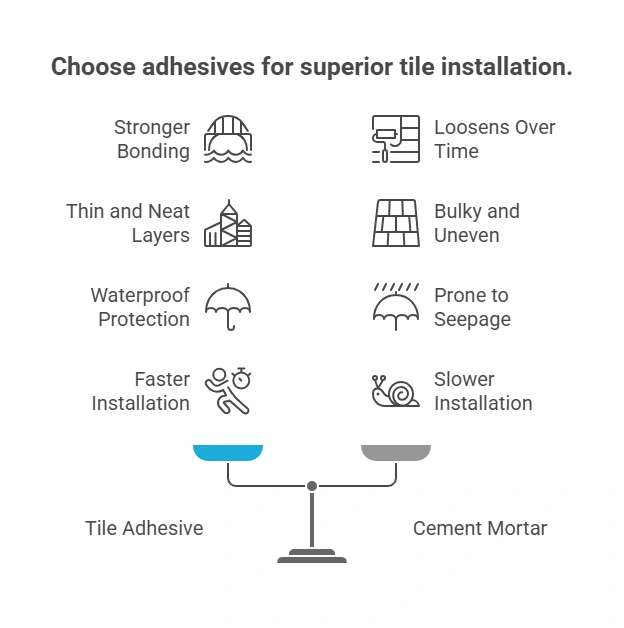
When installed with care and the right materials, your tiles can retain their beauty and structural integrity for many years to come. And, cement is not the only choice for securing your tiles in place.
Designed to work with a wide range of materials and surfaces, tile adhesive offers a modern, efficient solution. It ensures precise tile alignment, saves time and reduces the risk of cracks developing in the future. So, let’s discuss further to explore the incredible advantages of tile adhesive.
What Is A Tile Adhesive?

Tile adhesive is an excellent product engineered to perfection for firmly attaching tiles to floors, walls, countertops and more.
Crafted from a precise mix of Ordinary Portland Cement (OPC), polymers and selected aggregate particles, tile adhesive is further fortified with additives.
The adhesive is available either as a pre-made paste ready to apply or a dry mix that only needs water to become usable, for better convenience. It stands out as a great partner for all construction and remodelling projects.
Unlike traditional cement, modern ceramic tile adhesive and porcelain tile adhesive provide excellent bonding strength across various surfaces, ensuring tiles stay intact even in high-traffic or high-moisture areas. Whether you are installing adhesive floor tiles in your living room or choosing wall tile adhesive for your kitchen backsplash, you can find a product tailored to your specific need.
Based on their composition, functionality and intended use, it is classified into several types to match the right fit for every tiling installation.
-
Type 1: It is mainly tailored for use with smaller tiles in dry, indoor environments. If you have clay or non-vitrified ceramic tiles, this type is the best fit.
-
Type 2: This type brings greater water resistance, making it a fantastic choice for spaces with moisture exposure. It works well in both interior and exterior areas. Fully vitrified tiles, glass mosaic tiles and dense stones in larger sizes can be paired with type 2 adhesive.
-
Type 3: It is formulated to be the ideal adhesive for exterior walls made of plaster or concrete. It brings amazing results with ceramic, clay, porcelain or glass mosaic tiles.
-
Type 4: Specifically made for use on dry wallboard, this adhesive type bonds with a variety of stones and tiles, though it is not compatible with metal tiles or engineered stones.
-
Type 5: You can use type 5 adhesive for tiles and stones placed on glass, metallic or cement-based substrates. And, this product is extremely effective for metal, glass and engineered stone tiles.
Added Content: For special applications such as swimming pools, spas, and outdoor fountains, pool tile adhesive is recommended. This specialized adhesive resists continuous water immersion and provides strong adhesion even under challenging conditions.
Why Should You Use Tile Adhesive?

Strong Bonding Power
The basic purpose of tile adhesive is to provide a lasting attachment between the tiles and the surface it rests on. The adhesive is known for its outstanding bonding strength, which makes it a superior choice over cement.
This bond helps maintain the smooth and secure placement of your tiles if it is applied properly. The adhesive stops them from shifting, chipping, cracking or coming loose as time goes by, even after regular use.
It also reduces the chances of hollow spots beneath the tiles. As the addition of polymers enhances the flexibility and bonding power of tile adhesives, they become better suited for areas with high foot traffic and moisture, such as the kitchen and bathroom.
The adhesive layer’s even and thin consistency exerts minimal pressure on the structure of the building. So, it promotes a stable foundation.
Whether you are working with adhesive wall tiles for vertical installations or laying adhesive floor tiles in heavy-use zones, choosing the best tile adhesive ensures unmatched bonding strength and durability.
Resistance To Water
Most standard tile adhesives are built to withstand water. The water-resistant feature makes them perfect for installations in areas exposed to frequent moisture, like kitchens, showers and bathtubs.
It plays a crucial role by ensuring that moisture cannot infiltrate the substrate, thereby guarding both your tiles and the surface beneath from damage.
You can also prevent the potential growth of mould and mildew under tiles. This is especially important in areas with higher humidity levels, where the adhesive’s water-resistant properties provide effective protection.
If your project involves areas such as swimming pool installations, which are subject to extreme moisture, opt for specific waterproof tile adhesive formulations. They offer the tiles a dependable barrier against water seepage.
There are also specialised heat-resistant tile adhesives, which can tolerate temperatures as high as 1000°C.
Easy Installation
Cement-based tile applications have time-consuming complexities. On the other hand, tile adhesive does not demand exact calculations and extensive preparation.
Instead, the adhesive shows a faster, more convenient way to get the job done with quick mixing and an easy-to-use approach. Using a notched trowel, you can spread it evenly across the surface for a smooth and consistent finish.
One application of this adhesive is sufficient to effectively cover an area of up to 1 meter. The extended workability also grants you additional time to adjust and realign your tiles with ease before they harden.
The simple application process significantly reduces the likelihood of mistakes as well. Also, tile adhesive eliminates the need for water curing, enabling faster tile installation and setting.
It is always wise to factor in the tile type, substrate, installation area and the space you need to cover when you are selecting a tile adhesive.
For those comparing tile adhesive price options, it’s important to note that while premium waterproof tile adhesive or porcelain tile adhesive may cost slightly more upfront, the ease of application and reduced labour time make it cost-efficient in the long run.
Improved Aesthetics
A well-applied tile adhesive guarantees a cleaner, more elegant and professional finish to your tiling layout. Its thin application layer gives a polished finish. The adhesive also allows for exact positioning to ensure that your edges, corners and transitions are neatly aligned.
When using wall tile adhesive, you get smoother joints and perfect alignments that improve the overall aesthetics of kitchens, bathrooms, and commercial spaces. This not only boosts the appeal but also adds long-lasting value to your interiors.
Cost-effective
Even though tile adhesive can be more expensive initially compared to standard cement options, when you consider long-term benefits, it often turns out to be more economical.
With its amazing bonding ability and flexibility, the chances of tiles getting cracked or damaged are very low. You can trust that your tiles will remain firm and safe, sparing you from the high cost of repairs or replacements.
The tile adhesive covers every inch of the surface efficiently while reducing excess product wastage as well. The quicker installation time combined with its ease of use helps you to cut down your labour expenses to a larger extent.
Choosing the best tile adhesive tailored to your project, whether it’s ceramic tile adhesive for living spaces, porcelain tile adhesive for heavy-duty flooring, or pool tile adhesive for aquatic installations—ensures durability and cost savings in the long run.
Considering the proven efficiency and reliability of tile adhesive, it is a sound investment for any task, large or small.
How to Choose the Best Tile Adhesive
Selecting the right product is just as important as the installation itself. Here are a few tips to ensure you pick the best tile adhesive for your project:
-
Consider the Tile Type: Use ceramic tile adhesive for standard wall or floor applications and porcelain tile adhesive for denser, low-porosity tiles.
-
Think About the Application Area: For kitchens and bathrooms, go with waterproof tile adhesive. For pools and fountains, a strong pool tile adhesive is essential.
-
Substrate & Environment: Drywall requires specialized wall tile adhesive, while outdoor areas demand flexible, weather-resistant adhesives.
-
Tile Adhesive Price Factor: Balance between quality and budget. Premium adhesives may have a higher upfront cost, but they save on repairs and maintenance in the future.
Common Mistakes to Avoid When Using Tile Adhesive
Even with the best tile adhesive, mistakes during installation can compromise results. Here are common pitfalls to avoid:
-
Applying adhesive too thickly, which can cause uneven surfaces.
-
Using the wrong adhesive for heavy-duty adhesive floor tiles or moisture-exposed adhesive wall tiles.
-
Not cleaning the substrate properly before application.
-
Ignoring manufacturer’s mixing and curing instructions.
By steering clear of these errors, you can achieve a long-lasting, flawless finish.
Tile Adhesive vs Traditional Cement Mortar

Homeowners often compare tile adhesive with traditional cement mortar. Here’s why adhesives outperform cement:
-
Bonding: Adhesives provide stronger bonds, while cement may loosen over time.
-
Thickness: Adhesive layers are thin and neat, whereas cement creates bulky, uneven finishes.
-
Moisture Protection: Waterproof tile adhesive prevents seepage, unlike cement.
-
Speed: Adhesive installation is faster, saving time and labour.
If you’re aiming for durability, aesthetics, and reliability, tile adhesive is the clear winner.
Applications of Tile Adhesive
Tile adhesive is versatile and can be used in multiple settings:
-
Residential Homes: Kitchens, bathrooms, and living rooms using adhesive wall tiles and adhesive floor tiles.
-
Commercial Spaces: Restaurants, cafes, and offices where the best tile adhesive ensures long-term durability.
-
Outdoor Areas: Balconies, terraces, and facades with weather-resistant porcelain tile adhesive
-
Pools & Spas: Specialized pool tile adhesive designed to resist continuous water immersion.
Final Thoughts
So, we have discussed the many positive qualities of tile adhesive, and now you can see why it is such a vital tool. We hope this post helps you make an informed decision.
At Lakshmi Ceramics, we bring you a wide range of adhesive wall tiles, adhesive floor tiles, and specialized products like waterproof tile adhesive and pool tile adhesive. Whether you’re looking for the best tile adhesive at a competitive tile adhesive price, we’ve got the right solution to make your tiling project seamless and long-lasting.
At Lakshmi Ceraamics, we extend our warmest wishes for all your tiling projects.
FAQs
1. What are the advantages of tile adhesive?
It offers strong bonding, easy application, precise alignment, faster installation, and better durability compared to cement.
2. How long will tile adhesive last?
With proper application, it can last 15 - 20 years or more.
3. Which is better, tile adhesive or cement?
Tile adhesive is better, it provides stronger bonding, prevents cracks, and ensures smoother installation.
4. Which is better, tile adhesive or mortar?
Tile adhesive is usually better as it’s easier to use, gives uniform coverage, and works well for modern tiles.
5. Can we use tile adhesive as cement?
No, adhesive is for fixing tiles only; cement is for structural construction.
6. How long do adhesive floor tiles last?
They last 10 - 25 years, depending on usage and maintenance.

Whatsapp Chatx
Hi! Click one of our representatives below to chat on WhatsApp or send us email to customercare@lakshmiceramics.in
 |
Mr. Ram S +91 96551 70955 |
 |
Mr. Martin +91 78688 86655 |
We will love to hear from you!
